
Cat Constipation: Symptoms, Treatment, and Home Remedies
Overview
Cat constipation can be a distressing issue for both cats and their owners. It is characterized by infrequent or difficult defecation, often leading to hard, dry stools and discomfort for your beloved pet. Recognizing the symptoms early is crucial, as it allows you to address the problem before it escalates, ensuring your cat remains comfortable and healthy.
As a caring pet owner, it’s natural to feel concerned about your furry friend’s well-being. The discomfort caused by constipation can be upsetting, and it’s important to know that there are compassionate solutions available. Veterinary treatments, such as laxatives and dietary changes, can provide relief, and your veterinarian can guide you through these options with expertise and care.
In addition to professional treatments, there are also home remedies that can be beneficial. Increasing your cat’s hydration and fiber intake can make a significant difference in managing and preventing constipation. These simple adjustments not only promote better digestive health but also show your pet how much you care about their comfort and happiness. Remember, you are not alone in this journey; many pet owners face similar challenges, and together, we can find the best ways to support our feline companions.
Introduction
Recognizing the signs of cat constipation can be a distressing experience for any pet owner. This condition, characterized by infrequent or difficult defecation, not only causes discomfort but may also signal underlying health issues that require immediate attention.
It’s completely understandable to feel worried when your feline friend is struggling. Understanding the symptoms and treatment options available is crucial for ensuring your cat’s well-being. Timely intervention can prevent serious complications, giving you peace of mind.
So, how can you effectively manage this common yet concerning issue? What steps can you take to promote your beloved pet’s digestive health? Rest assured, you are not alone in this journey, and there are compassionate solutions available to support you and your furry companion.
Define Cat Constipation: Understanding the Condition
As a pet owner, noticing irregularities in your cat’s bowel movements can be concerning. Infrequent or difficult defecation, often presenting as hard, dry stools or even an inability to pass stool, can lead to cat constipation and cause discomfort for your beloved feline. This condition not only affects their well-being but may also lead to more serious medical complications if not addressed in a timely manner. It’s essential to recognize that challenges such as cat constipation in passing stools can signal underlying health issues, which is why closely observing your cat’s bathroom behavior is so important.
Regular bowel movements are a vital sign of good health in cats, and any significant changes, including cat constipation, should prompt you to seek advice from a veterinarian. Remember, you are not alone in this; many pet owners face similar worries. By being attentive and proactive, you can help ensure your cat remains happy and healthy. If you’re ever in doubt, don’t hesitate to consult with a professional who can provide guidance tailored to your furry friend’s needs. Your cat deserves the best care, and taking these steps can make a world of difference in their life.
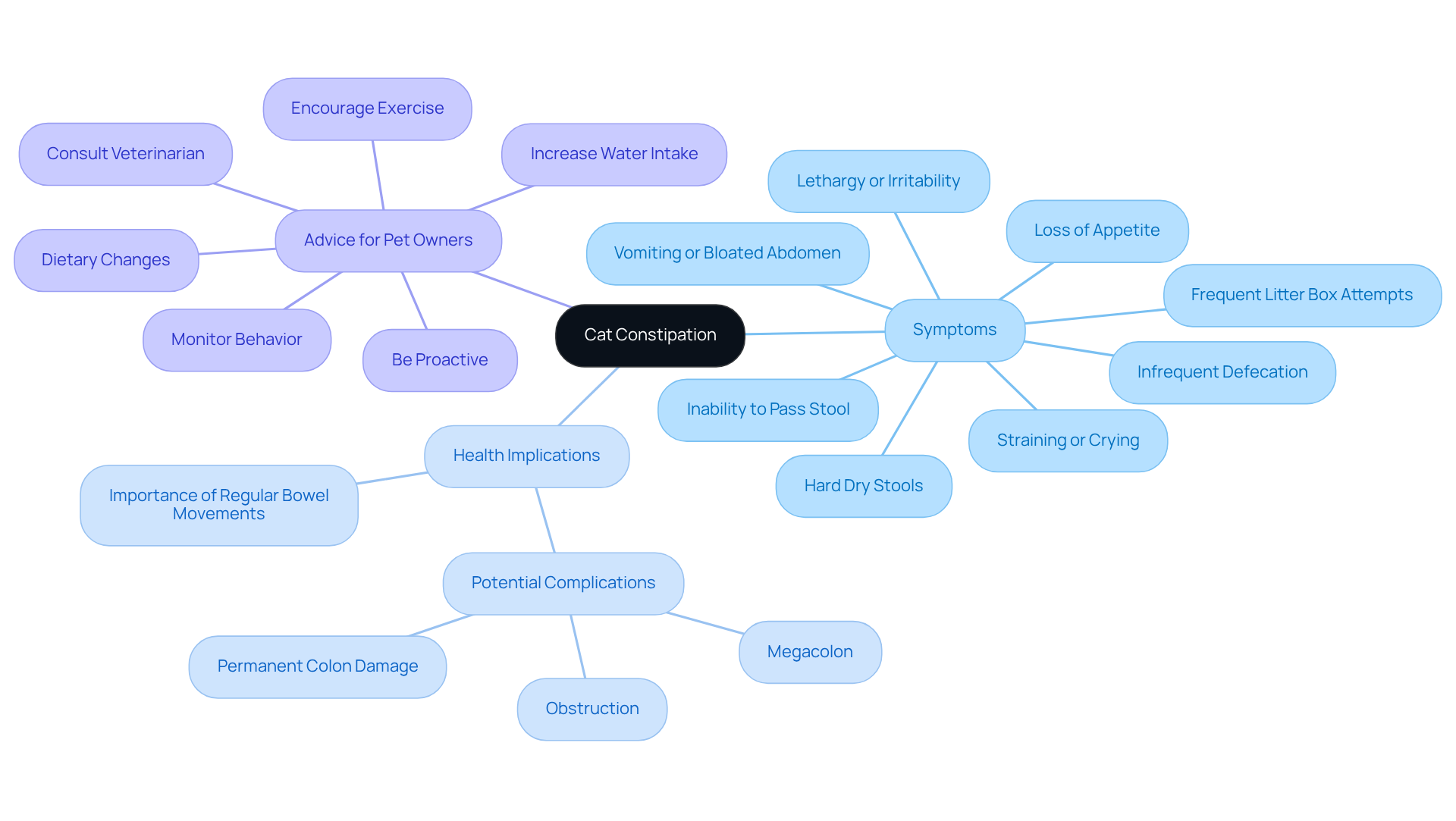
Identify Symptoms: Recognizing Signs of Constipation in Cats
As a loving cat owner, it can be distressing to witness your feline friend struggling with constipation. Common symptoms to watch for in cases of cat constipation include:
- Straining to defecate or prolonged attempts without success
- Producing little to no feces over a 24-hour period
- Hard, dry feces that may be difficult to pass
You might also notice signs of discomfort, such as:
- Meowing or crying while trying to relieve themselves
- Changes in appetite
- Increased lethargy
Frequent trips to the litter box without producing stool can be particularly concerning.
Recognizing these indicators promptly is crucial, as even the first instance of irregular bowel movement should be treated as an emergency. It’s heart-wrenching to think about the discomfort your cat may be experiencing from cat constipation, and most cases of feline bowel obstruction require intervention to prevent further complications and provide relief. Symptoms like lethargy, lack of appetite, and vomiting can indicate a more serious condition, which is why immediate attention is necessary. Dr. Jo Myers wisely notes, “Cats with chronic constipation usually require ongoing, intensive medical management.” This insight underscores the importance of monitoring your cat closely and reaching out to a veterinarian if any of these symptoms arise.
In the meantime, there are compassionate steps you can take at home. Simple treatments, such as adding fiber to your cat’s diet or giving oral stool softeners, may offer immediate relief before seeking veterinary care. By being proactive, you can ensure timely care and comfort for your beloved companion, reinforcing the bond you share and helping your furry friend feel their best.
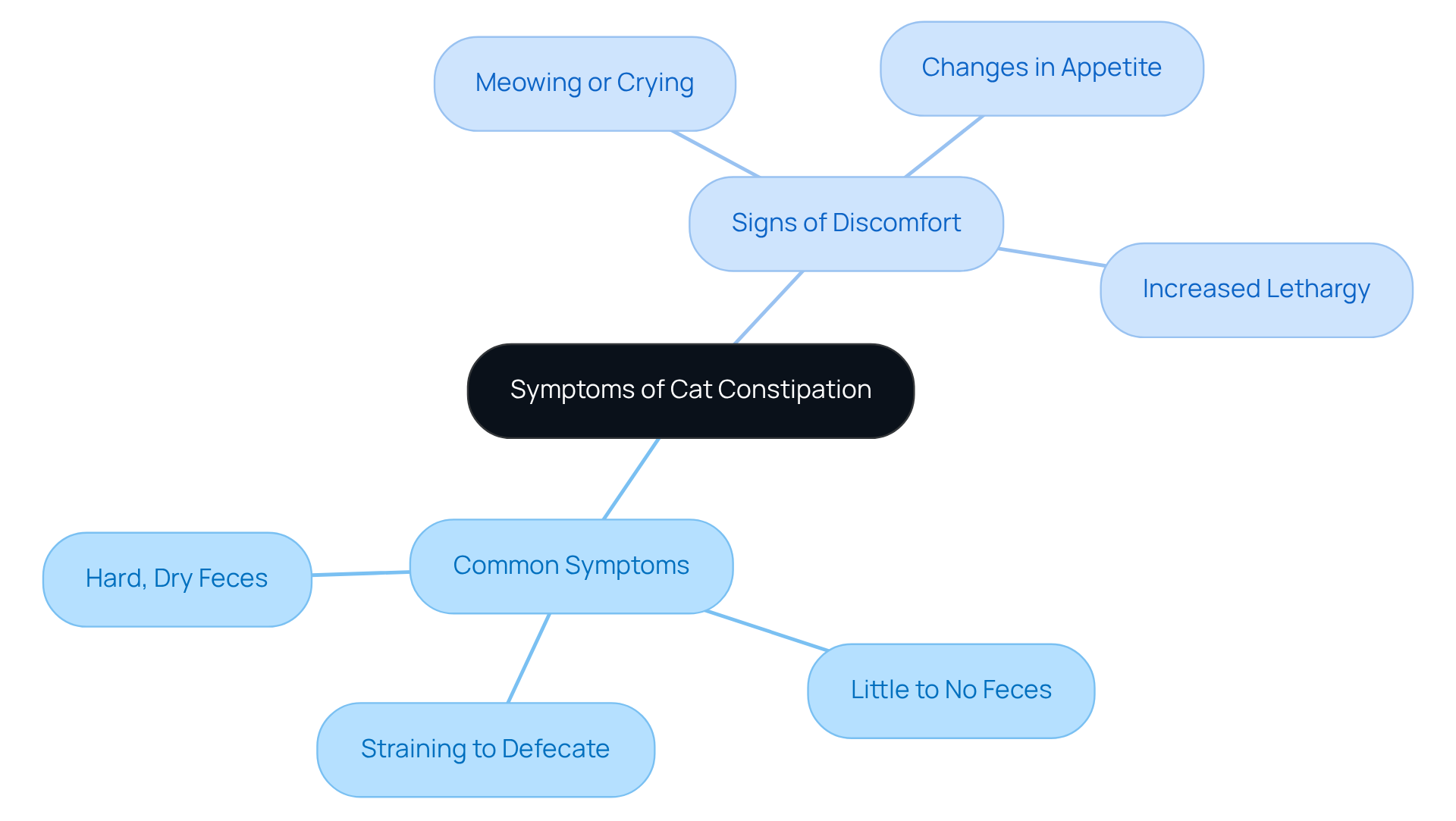
Explore Diagnosis and Treatment: Veterinary Approaches to Cat Constipation
When your beloved cat faces the discomfort of cat constipation, it can be a deeply worrying experience. Veterinary diagnosis typically begins with a thorough physical examination, often supplemented by diagnostic imaging, like X-rays, to assess the severity of the condition. Understanding the options available can help ease your concerns and ensure your feline friend receives the best care possible.
Treatment options are carefully tailored to address the underlying cause and severity of cat constipation. In severe cases, administering enemas or performing manual extraction of feces can provide immediate relief from discomfort. Additionally, prescribing laxatives or stool softeners can facilitate bowel movements, significantly enhancing the quality of life for affected felines. Implementing dietary changes to include more fiber-rich foods is essential for promoting regular bowel movements, as addressing cat constipation and ensuring adequate hydration is crucial, since dehydration often contributes to bowel issues in cats. It’s also important to address any underlying health issues, such as gastrointestinal disorders, that may exacerbate the situation.
A particularly noteworthy option is cisapride, which has emerged as an effective remedy for gastrointestinal motility disorders, including cat constipation and other irregular bowel movements. By stimulating intestinal muscles, cisapride promotes regularity, offering hope for many cats. While it is generally well tolerated, awareness of potential side effects, like abdominal cramping, vomiting, and diarrhea—especially at higher doses—is essential. Careful monitoring is necessary when using cisapride alongside other medications, particularly those with narrow safety margins.
Regular veterinary check-ups are vital for monitoring your cat’s health and preventing recurrence, ensuring that any potential complications are addressed promptly. As Dr. Brad Hinsperger, a compassionate veterinarian, notes, ‘The main advantage of using cisapride for felines is that it can assist in alleviating or even removing symptoms linked to gastrointestinal issues such as cat constipation, megacolon, and GERD.’ This underscores the importance of veterinary guidance during treatment, ensuring the best outcomes for your cherished pet. Remember, you are not alone in this journey; seeking help and support is a courageous step towards your cat’s well-being.
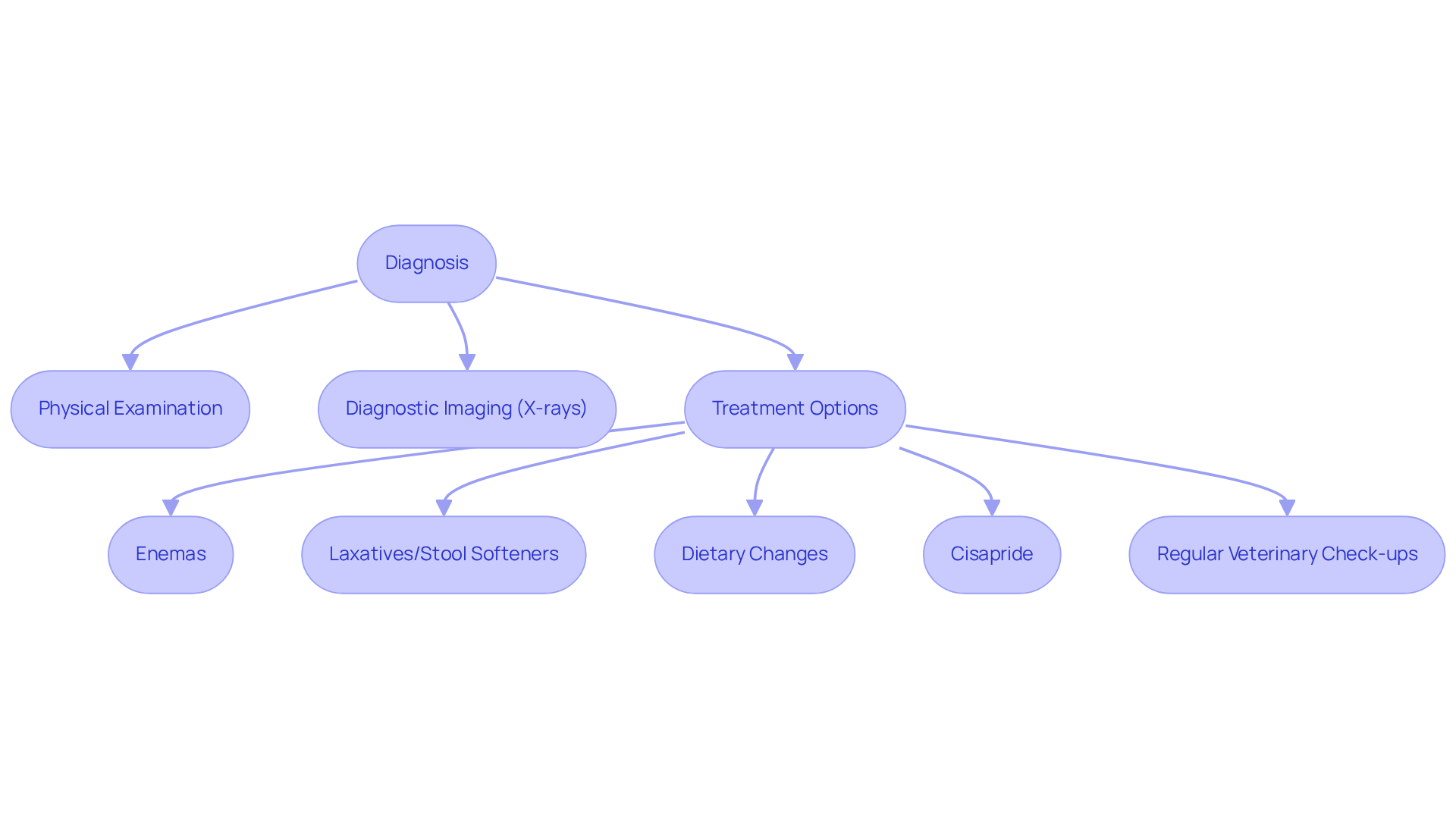
Implement Home Remedies: Managing Cat Constipation at Home
For those mild cases of constipation that can cause concern for loving cat owners, several home remedies may provide comfort and promote regular bowel movements in your feline friend.
- Increase Water Intake: It’s essential to ensure your cat has access to fresh water at all times. A water fountain can encourage them to drink more, which is so important for preventing dehydration-related constipation. As Dr. Luqman wisely notes, “Hydration is key to maintaining healthy bowel movements in cats.”
- Incorporate High-Fiber Foods: Adding high-fiber foods like canned pumpkin or psyllium husk to your cat’s diet can help maintain healthy digestion and ease bowel movements. However, it’s important to remember that dietary changes may take about eight to twelve weeks to show results, as highlighted by veterinary professionals who truly care about your pet’s health.
- Use Lubricants: Consider mixing a small amount of olive oil or coconut oil into their food; this can gently lubricate the digestive tract, aiding in smoother bowel movements. Nicole Cosgrove emphasizes, “Natural oils can be a gentle way to support your cat’s digestion,” reminding us of the nurturing approach we can take.
- Encourage Regular Exercise: Engaging your cat in regular playtime and providing interactive toys can stimulate physical activity, which is essential for promoting normal intestinal movement. Case studies have shown that increased activity can significantly enhance bowel well-being, allowing your beloved pet to feel their best.
- Monitor Litter Box Habits: Keeping a close eye on your cat’s litter box usage and stool consistency is vital. It’s recommended to monitor defecation frequency at least twice a week initially, adjusting their diet as necessary based on their habits. Dr. Amanda advises, “Regular monitoring can help catch any issues before they become serious,” emphasizing the importance of attentive care.
Always consult with a veterinarian before starting any home remedy to ensure it is safe and suitable for your cat’s particular wellness requirements. Veterinary experts stress that while home treatments may be helpful, they should support, not substitute, professional veterinary guidance, especially if the issue persists. Your cat deserves the best care possible, and you are not alone on this journey.
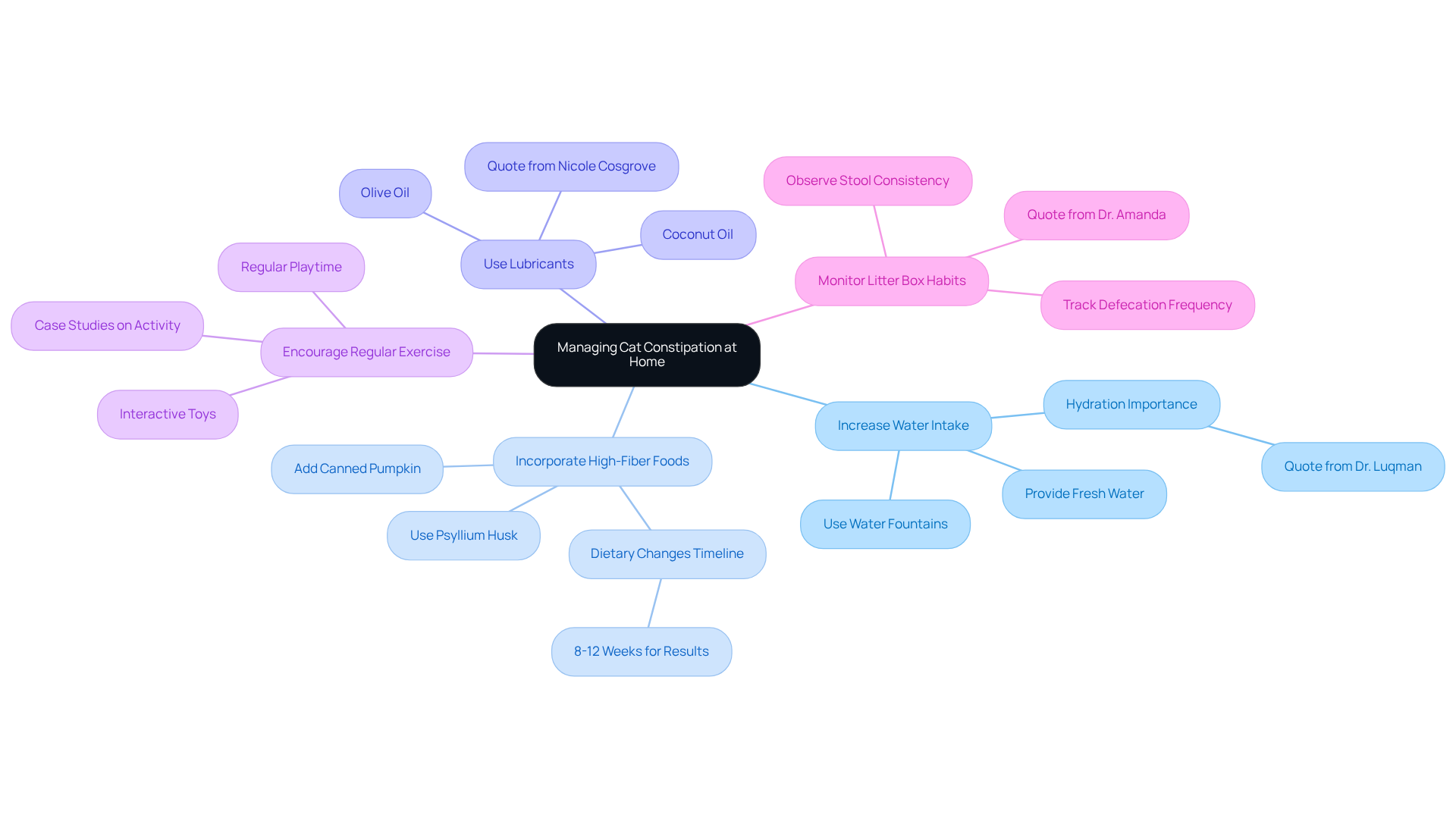
Prevent Constipation: Strategies for Maintaining Feline Digestive Health
To effectively prevent constipation in your beloved cat, consider implementing the following nurturing strategies:
- Providing a balanced diet that is rich in fiber and moisture is essential. Incorporating wet food options not only enhances hydration but also supports digestive health. Fiber plays a crucial role, aiding in regular bowel movements and helping to prevent hard, dry stools. Ideally, cats should poop 1-2 times a day, so keeping a close eye on their bowel movements is vital for their well-being.
- Ensure that your cat has constant access to fresh water, as hydration is key to maintaining healthy digestion. Dehydration can often lead to discomfort, so placing multiple water bowls around your home can encourage your furry friend to drink more.
- Regular grooming is also important to minimize hairballs, which can contribute to digestive blockages. Keeping your cat’s fur tidy and free of excess hair can significantly lower the chances of digestive issues, showing your care for their comfort.
- Encourage physical activity through engaging play and interactive toys. Regular exercise not only keeps your cat fit but also stimulates their digestive system, promoting regular bowel movements. Increased activity can help alleviate minor digestive discomfort, as supported by various case studies.
- Lastly, scheduling regular veterinary check-ups is crucial for monitoring your cat’s overall health. Timely identification of potential problems can prevent complications related to digestive issues, especially in older cats or those with existing medical conditions. Routine veterinary attention is essential, as noted by Dr. Jo Myers, who emphasizes that feline digestive issues are often indicative of other health concerns.
By adopting these compassionate strategies, you can significantly enhance your cat’s digestive health and reduce the risk of cat constipation, ensuring a happier and healthier companion by your side.
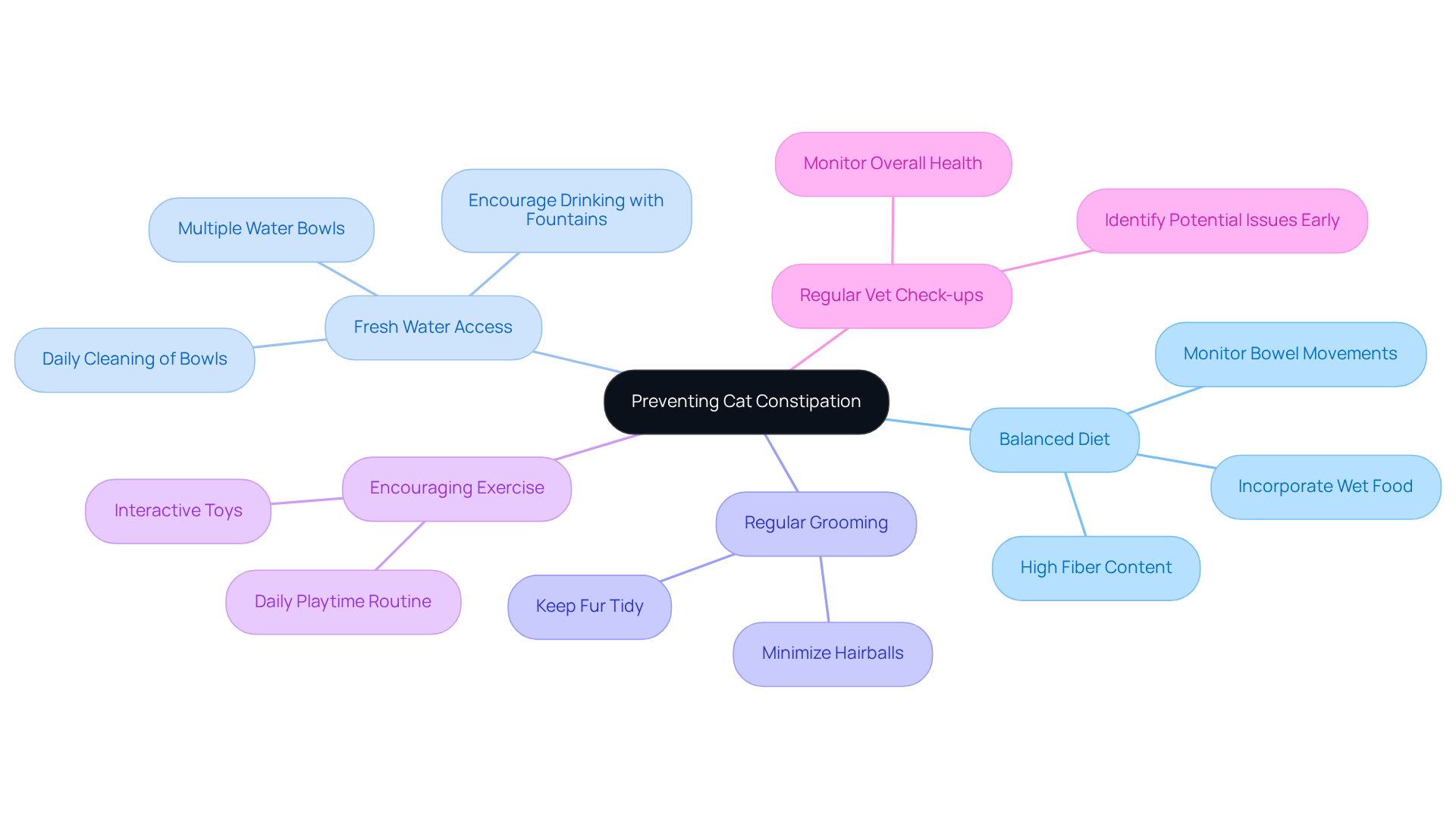
Conclusion
Recognizing and addressing cat constipation is essential for the well-being of our beloved feline companions. This condition not only disrupts their comfort but may also indicate more serious health issues. By understanding the symptoms, treatment options, and preventive measures, pet owners can take proactive steps to ensure their cats remain healthy and happy.
It’s vital to monitor bowel movements and recognize signs of discomfort, seeking veterinary advice when necessary. Simple home remedies, such as increasing water intake and incorporating high-fiber foods, can offer immediate relief for mild cases. Moreover, regular veterinary check-ups and a balanced diet are crucial in preventing future occurrences of constipation.
Ultimately, a cat’s well-being relies on attentive care and timely intervention. By implementing the strategies discussed, pet owners can significantly enhance their cats’ digestive health and overall quality of life. Taking these proactive measures not only nurtures a deeper bond between owner and pet but also ensures that every feline can enjoy a life free from the discomfort of constipation.
